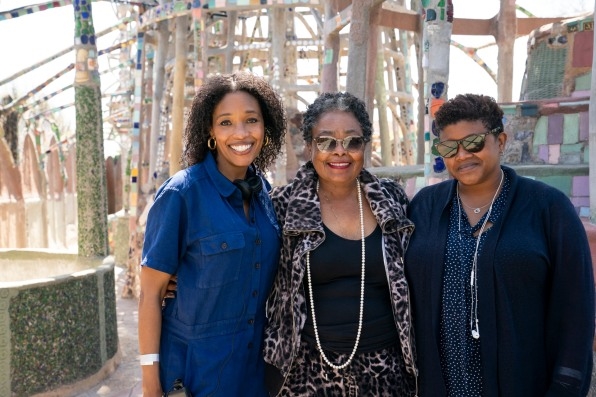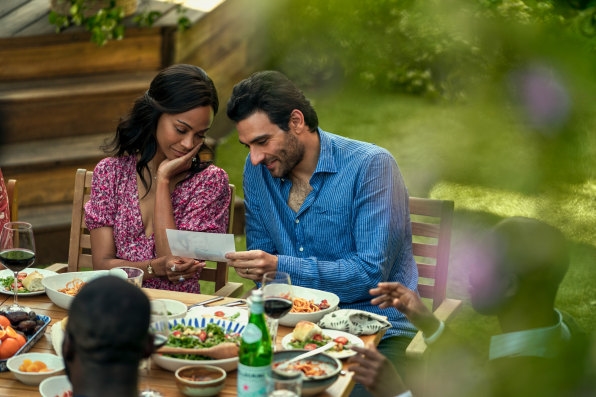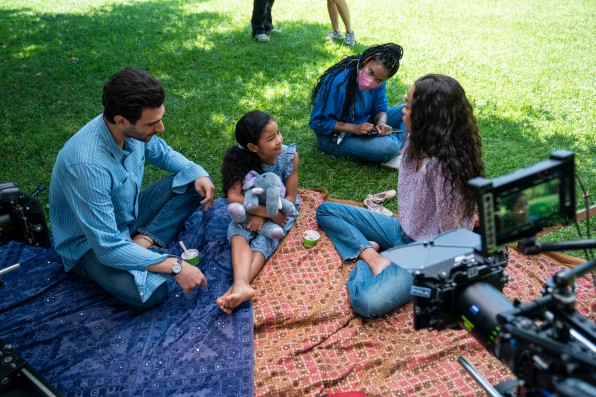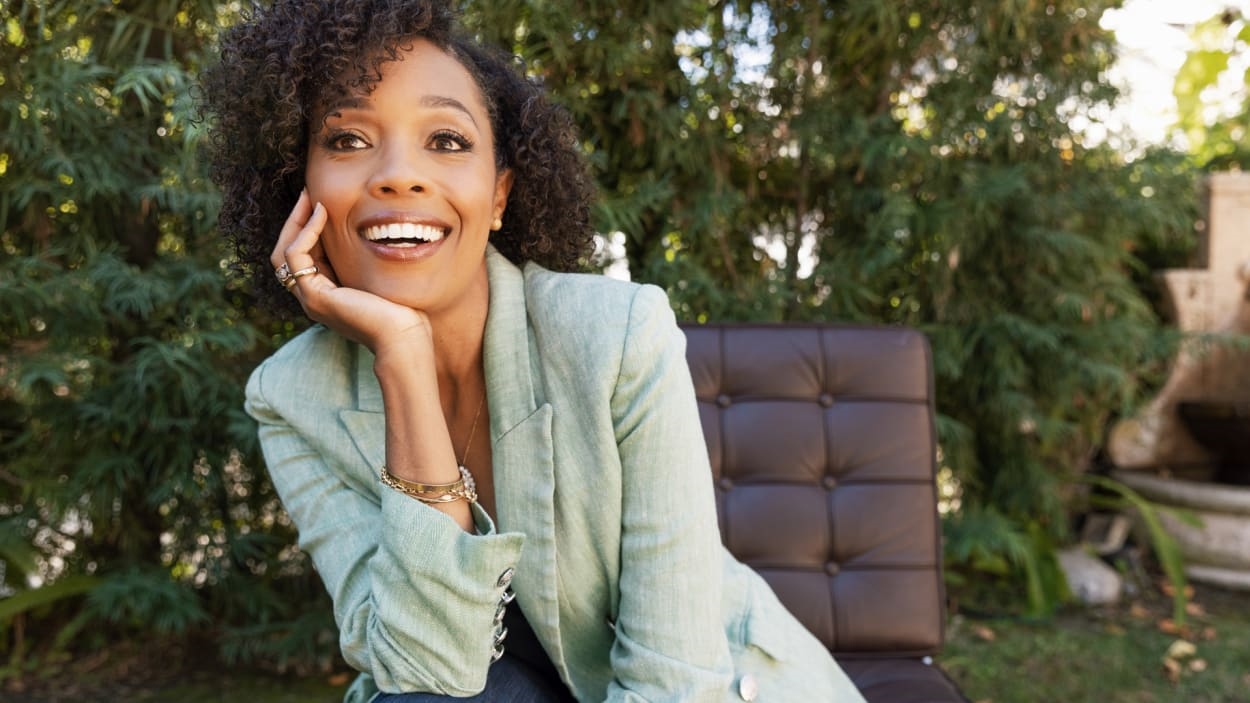The collaborative spirit behind Netflix’s From Scratch success
By Jenna Abdou
Dr. Winteringham, Via Ortolano, Dott, Ronaldo Muscarella.
These are the characters, street names, and public signs in From Scratch. Details unnoticed by viewers that are deeply resonant for the cast and crew. The names belong to their loved ones who have passed or impacted their lives in a meaningful way. They’re also a manifestation of cocreators and sisters Attica and Tembi Locke’s vision for the series they produced with Hello Sunshine for Netflix.

I was moved to tears reading From Scratch—Tembi’s love story with her late husband, Saro, amid his decade-long battle with cancer—and was curious how she approached such an intimate collaboration. The collection of names represent her intention that the show reflect everyone’s story, not just her own. Here, she shares the spirit of openness that earned them Netflix’s coveted number one spot.
Fast Company: You unknowingly offered me wisdom that kept me committed to a creative risk: Risk-taking is a process of expansion. Still, there are periods of contraction that you come to anticipate. What contractions arose when you were working on the series and how did you navigate them?
Tembi Locke: The pattern of expansion and contraction is always happening in our lives. It began immediately when I started writing the book; wonderful expansion followed by complete terror and what have I done? It never ends. The good news is that over time you can feel it coming and can observe it without letting it derail you.
There’s a discernment you have to make when you’re in a contracted state: Is this fear arising because this situation is against my value system? Am I just afraid of expanding? Or, am I feeling somehow unsafe in this dynamic?

While filming, when I felt contractions on set, I did a stress test to see where they were coming from. Once I knew what I was feeling, I asked: What next step can I take that will allow me to lead from love and serve the story, so I can show up in my best self? I was aware that making the show didn’t come to pass only for me to show up in my contracted self and get in my own way or in the way of the work. In order for the show to succeed professionally and creatively, I had to stay as open as possible.
FC: You were intentional that From Scratch illustrate the whole human experience, including parts that are often stripped of their rawness, like your seven-year-old daughter asking you what happens if you die too. How have you learned to advocate for your vision, especially when it’s so personal?
TL: Before I can advocate for my vision, I have to listen to someone else’s. Producing my own story for screen taught me that I need someone to see my story outside of solely my own lived experience. I need to hear what works for the other people who are cocreating the story with me, and then say: Can we add this? It’s about finding what’s working and what they see that maybe I am not seeing. Then, it’s inviting them to see a piece of what they may not know because they didn’t live it. It’s intensely collaborative.

A lot of it was me talking to my sister and the directors. There were many times I’d say: That’s fine. Then, I’d check in with myself and say: You know, this still feels a little off. Can I share this part of what happened in life with you because it feels important to the essence of the story? Does it resonate with you? Can we achieve that together? Then, we’d game-plan it. Other times, I had to step away to trust that enough of the emotional truth of the story was present that I didn’t have to sweat small details.
FC: We all go into collaborations anticipating compromise. Still, how did you arrive at a place of agreement when a decision influenced the nature of your story without feeling attached to it?
TL: I try to use a “Yes and” approach. “No” shuts down creatives. To create art, you have to be an open channel and be vulnerable. It’s the only way art is made. Every creator comes to the work saying: I’m bringing my lens on the world to this experience. Being told “No” without dialogue about the creative differences can change the energy on set and thwart the spirit of collaboration.
I tried to say: Let’s do it both ways. The productive friction between one person’s point of view and another’s is how the art gets made. Attica and I leaned into the creative tension points and said: Let’s see what can emerge by putting the alchemy of these ideas together.
FC: The vulnerability is what keeps us in our seats. What do you think allowed everyone to show up individually vulnerable and then to connect from that place?
TL: Attica and I were very clear that everyone there was a gift to us. We tried to meet everyone in a nonhierarchical way, just human to human. I think that intention set the stage for people to share feedback and be vulnerable with me. We’d talk with crew members at the craft services table and they’d share a personal story. I really listened with my heart because I knew everyone’s lived experience touched our story. We have all lived through love and loss. And when people feel invested, they naturally give more. The intimacy you feel on screen came from the culture we created on set.

[Photo: Jessica Brooks/Netflix © 2022]
FC: Mental, emotional, and spiritual health are an important part of your process. You began your days with prayer and meditation because you knew this project was going to require all of you. What is the relationship between your state of being and your creativity and leadership?
TL: They’re very interconnected. I have to attend to my physical, emotional, and spiritual well-being to be creative. It’s only from there that the channel opens for creativity to flow in and for me to be clear in my artistic point of view. I can then lead with clarity because I know what’s moving us as storytellers towards the creative North Star.
Even as a producer and author of the source material, I always asked myself: Why am I here? How can I be of service? What serves the love? I can only answer those questions when I do the foundational work of checking in with myself first, a quick internal scan: Do I need to attend to my physical being? How is my emotional self? If I do nothing else today, how can I align myself with purity of spirit? I’ve learned these shortcuts. And even if I have only 10 minutes, which is common amidst the pressures of production, How can I tune into one of these areas?
FC: Your humility has only deepened amidst the show’s success. What helps you manage your expectations around a project that’s your own life story?
TL: I’m so truly grateful for the success of the show. And the gift of having been an actor for two decades is that you learn to show up humbly and do the best you can with no promises that any of it will work out. You might get the part, you might not get the part. You might film it, then be cut out of it. So you can’t focus on the result over the process.
For me, every day is about the work. And, if it’s about the work, not the success of the work, then what does the work call for, and what is my part contributing to that? So I bring that mindset to the work and then see what happens. That’s all you can do, right? Bring humility to the work and see what happens.
Jenna Abdou is the creator and host of 33Voices.
(30)



